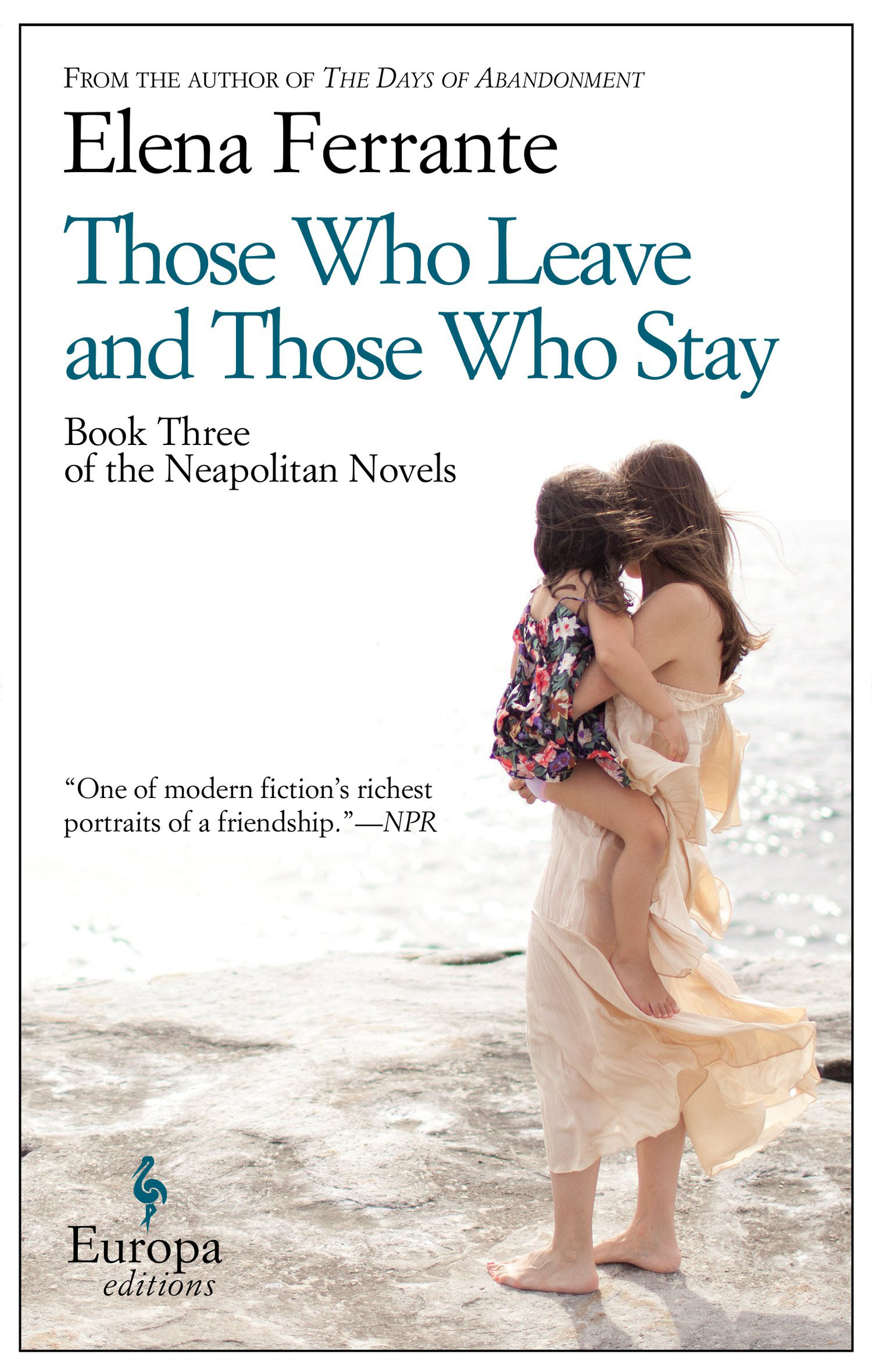Those Who Leave and Those Who Stay
by Elena Ferrante, translated by Ann Goldstein
reviewed by Victoria Zhuang
Virginia Woolf once called George Eliot’s Middlemarch “one of the few English novels written for grown-up people.” The same thing could be said of Elena Ferrante’s rich, engrossing, gloriously uncompromising third book in the bestselling Neapolitan series, Those Who Leave and Those Who Stay. Like Middlemarch, it is a bildungsroman written by a woman about a woman. Ferrante’s Elena Greco, an intelligent and unhappily married writer in 1960s Naples, bears some traces of Dorothea Brooke’s intelligence and unhappy wifehood. Like Middlemarch, Those Who Leave also has a kind implacability, like an Old Testament flood sweeping through the plains of human experience, drenching anyone who would dare to call it mere “women’s literature.”
Ferrante plunges in from the start with a rain of narrative details. An older Elena walks down a street with Lila, the great friend of her youth. They are wary of each other. “I was the only one talking, I remember: she was humming, she greeted people who didn’t respond, the rare times she interrupted me she uttered only exclamations, without any evident relation to what I was saying.” They are led to see the corpse of a woman they used to know, and while Lila’s reaction is characteristically cold, Elena cries. Perhaps this is a cry of recognition, too: seeing embodied the death of all women in history, for it is this pain of the womb-bearers that she is to retell in the coming pages.
One woman is always leaving the other behind, or, rather, “fleeing” her, as the original “fugge” of the Italian title puts it. First Elena left their grubby, provincial hometown to become a celebrated author, rising academic, and now the wife of a prominent young Florentine professor. But Lila is not to be outdone; although she has dropped out of school, remained poor, and been through a failed marriage, her ambitions remain. Soon Elena falls into postpartum depression and stalls in her career, while the unusually intelligent, still-beautiful Lila finds success as a factory technician and revolutionary voice in the politically agitated moment of 1968. Whoever is faltering in the given moment chases the other down to beg for her support, yet every conversation is inevitably tense, full of bluffing, accusations, and denials, because the balance of power could shift at any moment—a new reversal is often lurking just around the following corner of the sentence. At some point it becomes impossible to tell who is chasing whom. In all cases Ferrante remains ahead of her reader.
The book’s center is Elena’s friendship with Lila, yet this woman-to-woman relationship is always threatened. The men in Lila’s life—kind Enzo, irresponsible yet brilliant Nino—spend more time with her than Elena does. Elena herself is walled off by her husband, the distracted and unappreciative Pietro, and only realizes, years into her marriage, that the confinement of womanhood has separated her from Lila, forcing them to compete for male attention. “We would have written together, we would have been authors together, we would have drawn power from each other, we would have fought shoulder to shoulder. The solitude of women’s minds is regrettable,” Elena says, reflecting sadly on her lifelong rivalry with Lila.
It may, however, be more complicated: Elena lies to herself at times, and Lila’s cynical remark to Elena that “Each of us narrates our lives as it suits us” could be easily made here. But Elena is believable enough in this moment. She and Lila are like the day and the night, an immortal pair in their clashes, and yet, even in their remoteness, seeking reunion.
Much of the book’s uncanny force derives from its being from the past, not only of the two preceding books in the Neapolitan series—My Brilliant Friend and The Story of a New Name—but from the entirety of Western literature. Ferrante has said in an interview that she studied classics at university, and there are few living writers, female or male, to rival her for an epic hand. Traces of the great European bards are never far from the pages of Ferrante’s book; its alternate title, “Middle Time,” suggests the limbo of Dante’s Inferno, and themes of homecoming, leave-taking, and home-founding call to mind the works of Homer or Virgil.
The latter is certainly felt in the novel’s bold turns to the future, and its motion of “fleeing” old ruins. Through her characters’ travels and travails, it could be said, Ferrante sings of arms and the woman. Elena struggles throughout Those Who Leave to find the courage to live and write again after enduring a dismissive husband and the widespread panning of her second novel. Through her, Ferrante has also broken through a wall of sorts, and though there is a tone of bitterness throughout the novel, it closes in a fire of triumphant exultation, not merely “fleeing” but taking flight. “I wanted to become, even though I had never known what,” Ferrante writes.
In the end, this is not a novel that, like Middlemarch, bows its head to the stuffy dictates and disappointments of provincial life. Its sensibility is Mediterranean through and through; it reads like the roar of waves coming on a beach, a surging, frothing psychological violence barely contained in the words. Listen, it says: “You can copy me, make a portrait as precise as an artist, but my shit will always remain mine, and yours will be yours.” Lila and Elena are phoenixes; they rise screeching terribly, and they soar, moving past fear into the realms of wonder. If everyone should read Middlemarch to know what women could have been, they should also follow Ferrante’s tale to learn that this is what women, not only as women but as people, are.
Published on November 3, 2015

